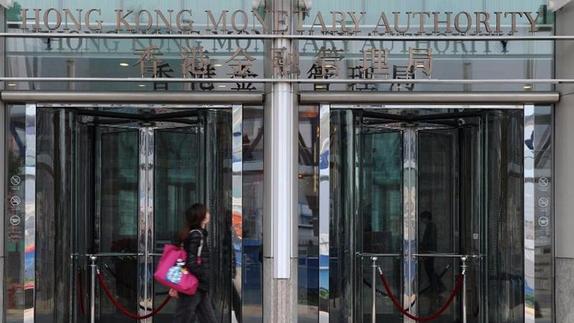 In this Dec 20, 2012 photo, a woman walks beneath signage for the Hong Kong Monetary Authority (HKMA). (PHOTO / AFP)
In this Dec 20, 2012 photo, a woman walks beneath signage for the Hong Kong Monetary Authority (HKMA). (PHOTO / AFP)
HONG KONG – The Hong Kong Monetary Authority and global central banks on Friday called on lenders and supervisors to stay vigilant and closely monitor the financial stability risks spreading from the recent banking crisis in the US and Europe.
Although Hong Kong has very little exposure to the troubled lenders, the city should carefully watch for any further banking failure “spillover”, HKMA Chief Executive Eddie Yue Wai-man said at the HKMA-BIS (Bank for International Settlements) Joint Conference.
Featuring the “future-proof supervision for an innovative banking world”, the long-planned joint conference in Hong Kong took place after a string of recent banking failures that began with the swift downfall of California-based Silicon Valley Bank (SVB).
Over 100 representatives from global central banks and supervisory authorities, as well as leaders of financial institutions, gathered at the luxury Rosewood Hong Kong hotel in Tsim Sha Tsui to discuss recent market developments
Once the US’ 16th-biggest lender, SVB — which focused primarily on tech startups — was shut down by regulators on March 10 amid a bank run, marking the second-biggest bank collapse in US history. Two days later, New York City-based Signature Bank also collapsed, the third-largest US bank failure.
Amid a dangerous decline in confidence in the global banking system, investment bank Credit Suisse was sold to rival Swiss lender UBS this week. As part of the takeover deal, the Swiss regulator determined that Credit Suisse’s Additional Tier 1 (AT1) bonds with a notional value of $17 billion would be wiped out.
Such bonds are a form of contingent convertible bonds that are part of the capital buffers that regulators require lenders to hold to protect themselves during market turmoil.
Yue nevertheless said the HKMA is “not very concerned” about the risks that the holdings of AT1 bonds of one bank will pose to the Hong Kong banking sector as such investments were sold only to private banking or professional investors, and not retail investors.
He said that Hong Kong has very limited exposure to all the banks that are now featured in the newspapers.
“The situation is largely stabilized, but we still need to watch whether there will be further spillover, especially to the other US regional banks,” Yue added.
READ MORE: HK banking system stable amid market jitters, says HKMA official
The banking gathering in Hong Kong marks the first major event this year to celebrate HKMA’s 30th anniversary.
Over 100 representatives from global central banks and supervisory authorities, as well as leaders of financial institutions, gathered at the luxury Rosewood Hong Kong hotel in Tsim Sha Tsui to discuss recent market developments.
Victoria Saporta, executive director of the Bank of England, said many jurisdictions should consider an above-zero countercyclical capital buffer — the amount of capital that banks must set aside to counter procyclicality in the financial system.
“The first reason is that policymakers don’t have a crystal ball. The second reason is it takes time to raise capital in a smooth manner,” Saporta said, adding that central banks should start raising the countercyclical capital buffer when risks in the financial system are above standard.
According to BIS, only eight out of 27 Basel Committee member jurisdictions set their countercyclical capital buffer at above zero this year. Hong Kong’s countercyclical capital buffer is 1 percent currently in effect.
ALSO READ: HKMA remains vigilant on SVB fallout
“The releasability of buffers is very useful macroeconomically,” she added.
Pablo Hernandez de Cos, chair of the Basel Committee on Banking Supervision and governor of Spain’s central bank, said in his keynote speech that great progress has been made over the past decade within the banking industry, but rules governing the links between shadow banks are not sufficient.
To mitigate risks to the banking system from interconnections with those nonbank financial intermediaries, there may be a need for additional measures, he added.


